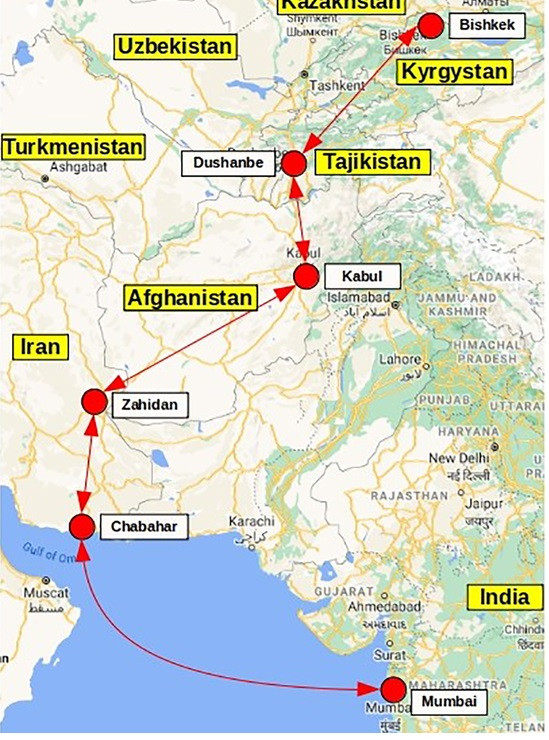Tajikistan and Iran have concluded a memorandum stipulating the future use of the Iranian port of Chabahar by Tajik cargo carriers.
On November 8, the transport ministries of Tajikistan and Iran, following the results of high-level negotiations during the official visit of the Iranian president to Dushanbe, signed a memorandum on the implementation of international cargo transportation and transit through the Iranian port of Chabahar.
The memorandum is a document that implies that the parties have considered and reached a certain agreement on certain intentions. In order for these intentions to be realized, it will be necessary to develop, negotiate, sign, and ratify an appropriate agreement that must specify all the necessary conditions.
What does the Chabahar memorandum mean?
The Ministry of Transport of Tajikistan indicates four main points that were agreed upon between the parties as part of this agreement:
- Simplification and coordination of procedures to improve the efficiency and effectiveness of transport routes through the port of Chabahar in terms of time and transit costs, as well as the mutual reduction of duties and taxes on motor transport.
- Attracting goods from other countries to the roads that cross the Chabahar port to facilitate access to regional and global markets through sea, rail, and road transport.
- Cooperation in mutual investments in the promotion of transport infrastructure projects on the roads passing through the port of Chabahar.
- Ensure the safety of passenger transport, vehicle movement, cargo storage, and environmental protection in accordance with international standards.
The parties are expected to establish a steering committee responsible for coordination and oversight of the provision and support of all institutional, human, and logistical resources.
On November 8, Tajikistan’s President Emomali Rahmon told the Entrepreneurs’ Forum of the Republic of Tajikistan and Iran that “the effective use of the possibilities of the port of Chabahar and the facilitation of entry and transit conditions for goods will help to expand opportunities for economic cooperation between the two countries.”
Chabahar is a seaport located in southeast Iran, on the shores of the Gulf of Oman. Its strategic importance is that it has direct access to the Indian Ocean, which is third in the world’s oceans deep and beyond the Pacific and Atlantic.
The port of Chabahar is called the “Golden Gate” of Afghanistan and Central Asian States, including Tajikistan.
Why does Tajikistan need this?
According to the republic’s Ministry of Transport, Tajikistan has access to the Indian Ocean through the port of Chabahar, through the territory of Uzbekistan, Turkmenistan, and Iran.
The shortest route from Tajikistan to this port passes through Afghanistan’s territory. However, owing to the country’s controversial political situation, its territory is not yet considered a transit route to port.
The Tajik Transport Administration believes that access to the seas (oceans) is one of the most important factors affecting a country’s social and economic development.

Tajikistan uses the Iranian port of Bandar Abbas, located in the Persian Gulf, to transport some products to some of the world’s most remote regions.
Shipping is the cheapest of all modes of transport.
First: shipping allows large quantities of goods to be transported simultaneously, reducing the cost of transportation per unit of goods.
Second: shipping is characterized by low fuel costs compared to other means of transport, which also helps to reduce transport costs.
Why does Iran need this?
The eastern part of Iran is less developed than the western part of the country, where 90% of the population lives. In this regard, the Iranian leadership intends to improve the situation in the East, including the development around the port of Chabahar, the free trade area, and the road and rail routes between the port and Central Asia.
The plan is to use it as a gateway to Central Asia and preserve the port of Bandar Abbas, which currently deals with 85% of Iran’s maritime trade.
Experts believe that the port of Bandar Abbas cannot serve large transoceanic cargo vessels. Currently, these vessels are docking in the UAE, and goods are reloaded on small vessels for shipment to Iran, making Iran dependent on supplies from the UAE.
Unlike Bandar Abbas, Chabahar port is capable of handling standard cargo vessels.








 GOOGL
GOOGL  AMZN
AMZN  MET
MET  T
T  WPM
WPM  DM
DM  SVM
SVM  CMC
CMC  HKDUSD=X
HKDUSD=X  BABA
BABA